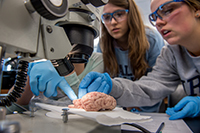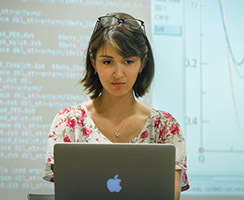Courses
Directed Readings: Intellectual Virtue and Science Education (Spring 2017)

This special one-credit invitation-only seminar course was taken by seven Neuroscience and Behavior major students and taught by Dan Lapsley and Dom Chaloner. The course was purposely designed to provide students with an introduction to the topic of intellectual virtue and science education while also providing a forum to discuss the broader ideas for the Virtuous Scientist program.
Specific objectives were, first, to better understand "intellectual virtues", especially in the context of science education, through discussion of the rich and robust philosophical, psychological, and learning sciences literatures on the types and qualities of intellectual reasoning apparent in education. Second, to integrate the existing knowledge to design educational experiences in university classes and labs that would develop intellectual virtues in scientists. Third, to prepare students to attend and participate in the "Intellectual Virtues and Science Education" consultation organized by the Virtuous Scientist Project. Fourth, to generate a manuscript that might be part of the scholarly product of the consultation.
The course met once a week for one-hour to discuss a variety of philosophy, psychology, and science education published papers. Many of the articles were written by scholars who had agreed to attend the May consultation. The instructors purposely wanted students to be prepared for the opportunity to meet and talk with these eminent scholars as well as other conference participants. In so doing, students would develop an even deeper understanding of the intellectual virtues and how they might be integrated into science education.
Course Schedule
Week 1: Introduction
Lapsley, D. & Chaloner, D. 2017. Intellectual virtues and science education. Grant proposal to the Institute for Scholarship in the Liberal Arts, University of Notre Dame.
Roche, M. 2009. Should faculty members teach virtues and values? That is the wrong question. Liberal Education 95:32-37.
Schwartz, B. & Sharpe, K. 2012. Colleges should teach intellectual virtues. Chronicle of Higher Education Feb. 19.
Week 2: Intellectual Virtue Part 1
Nicgorski, W. 1987. The college experience and character development. Pages 328-357 in K. Ryan & G.F. McLean (Eds.), Character development in schools and beyond. Praeger, New York, NY.
Roberts, R.C. & Wood, W.J. 2007. Chapter 1 Epistemology, Chapter 2 Goods. Pages 3-58 in Intellectual virtues: An essay in regulative epistemology. Oxford University Press, New York, NY.
Week 3: Intellectual Virtue Part 2
Baehr, J. 2011. Chapter 1 Introduction. Pages 1-16 in The inquiring mind: On intellectual virtues and virtue epistemology. Oxford University Press, New York, NY.
Battaly, H. 2008. Virtue epistemology. Philosophy Compass, 3 (4), 639-663.
Week 4: Intellectual Virtue and Education Part 1
Ritchhart, R. 2002. Re-thinking smart: The idea of intellectual character. Pages 12-31 In R. Richhart Intellectual character: What it is, why it matters, and how to get it. Jossey-Bass, San Francisco, CA.
Roberts, R.C. & Wood, W.J. 2007. Chapter 3 Virtues, Chapter 4 Faculties, Chapter 5 Practices. Pages 59-149 in Intellectual virtues: An essay in regulative epistemology. Oxford University Press, New York, NY.
Week 5: Intellectual Virtue and Education Part 2
Battaly, H. 2016. Responsibilist virtues in reliabilist classrooms. Pages 163-183 in J. Baehr (Ed.), Intellectual virtues and education: Essays in applied virtue epistemology. Routledge, New York, NY.
Roberts, R.C. & Wood, W.J. 2007. Chapter 6 Love of Knowledge. Pages 153-182 in Intellectual virtues: An essay in regulative epistemology. Oxford University Press, New York, NY.
Week 6: Intellectual Virtue and Education Part 3
Kotzee, B. 2016. Problems of assessment in educating for intellectual virtue. Pages 142-162 In J. Baehr (Ed.), Intellectual virtues and education: Essays in applied virtue epistemology. Routledge, New York, NY.
Week 7: Epistemological Reasoning and Epistemic Cognition
Hofer, B. & Pintrich, P. 1997. The development of epistemological theories: Beliefs about knowledge and their relation to learning. Review of Educational Research 67:88-140.
Week 8: Epistemic Cognition, Personal Epistemology and Science Education Part 1
Chinn, C.A. & Malhotro, B.A. 2012. Epistemologically authentic inquiry in schools: A theoretical framework for evaluating inquiry tasks. Science Education 6:175-218.
Week 9: Epistemic Cognition, Personal Epistemology and Science Education Part 2
Louca, L., Elby, A., Hammer, D. & Kage, T. 2004. Epistemological resources: Applying a new epistemological framework to science instruction. Educational Psychologist 39:57-68.
Week 10: Epistemic Cognition, Personal Epistemology and Science Education Part 3
Sandoval, W. 2005. Understanding students’ practical epistemologies and their influence on learning through inquiry. Science Education 89:634-656.
Week 11: Epistemic Cognition, Personal Epistemology and Science Education Part 4
Berland, L.K., Schwarz, C.V., Krist, C., Kenyon, L., Lo, A.S., and Reiser, B.J. 2015. Epistemologies in Practice: Making Scientific Practices Meaningful for Students. Journal of Research in Science Teaching 53: 1082–1112.
Week 12: Student Presentation and Discussion
Week 13: Student Presentation and Discussion
Week 14: Summary
First Year Course: Virtue and Vice in Science (Spring 2018)

This course will explore the why, how, and what if of intellectual virtue and vice in science. More specifically, why intellectual virtue is important in science, how scientists-in-training can develop and maintain their intellectual virtue, and what are the consequences of becoming more intellectually virtuous. The focus of the course will be on science, but the ideas and concepts encountered in the course will apply broadly to other intellectual endeavors and professional careers, both inside and outside of science. The course is purposely designed for first years that may be unsure or looking for insights about science education and training in which they will be engaged for the rest of their college careers. However, the course will also be useful to those in their sophomore, junior, and senior years, within and outside science, that are looking for a more nuanced and informed approach to their education.
Students will identify, develop, and maintain intellectual virtue with regular class discussion, individual reflection, and guided practice. The course will use a combination of approaches to help students. First, identify to what extent they already exhibit the intellectual virtues of wonder, humility, honesty, and courage. Second, develop practices to build these intellectual virtues. Primarily, this will be through discussion during class in smaller groups and outside of class using online forums. The focus will be on exemplars of various intellectual virtues in science, but especially centered on the discovery of the structure of DNA, and the various scientists that were involved in this transformative research discovery. Students will also be encouraged to discover and discuss their own exemplars. Reflection will take the form of regular written and spoken word assignments, for which students will be asked to express the extent to which they understand and see intellectual virtue, in themselves and others. Practice will take place with activities that students pursue during their education at Notre Dame. Students will be encouraged to seek out opportunities during their daily lives to exhibit and practice their intellectual virtue.
We do not expect students that take this course to instantly become perfect exemplars of intellectual virtue. Instead, students are expected to become more aware of the extent to which intellectual virtue and vice are involved in the successful discovery of truth, knowledge, and understanding, both in science and elsewhere. Furthermore, this course will provide a foundation upon which students will build as they progress through their university education and into their future professional careers. This course will help fulfill the broader mission of the University of Notre Dame which “is dedicated to the pursuit and sharing of truth for its own sake”, while providing “an environment of teaching and learning that fosters the development in its students of those disciplined habits of mind, body, and spirit that characterize educated, skilled, and free human beings”. Also, this course will help students to meet the need to, according to First Year Studies, “acquire the virtues necessary for living a good human life and prepares them to become leaders in their professions”.